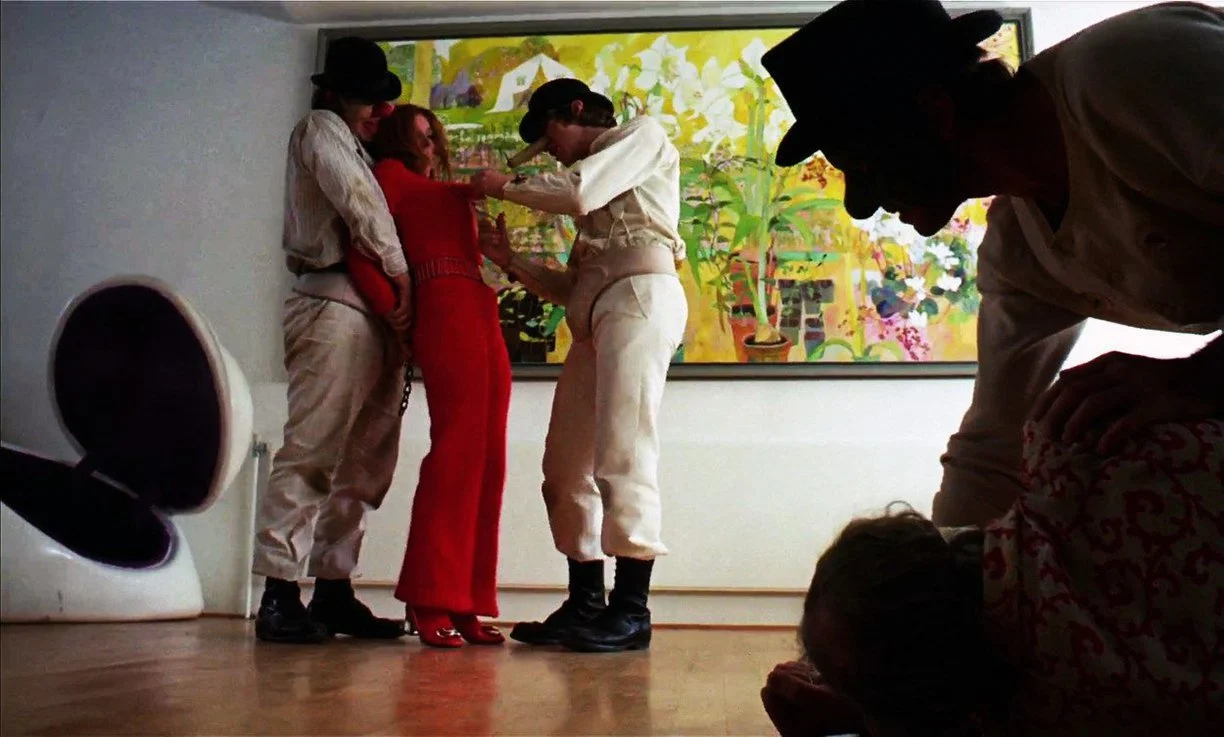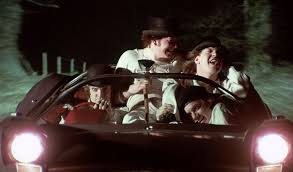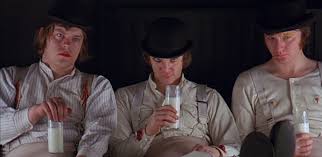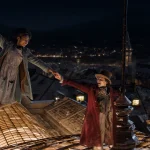A Clockwork Orange (1971)

A Clockwork Orange (1971) Review – A Dark Exploration of Free Will and Society
Introduction
Stanley Kubrick’s A Clockwork Orange (1971) remains one of the most controversial and thought-provoking films ever made. Based on Anthony Burgess’s 1962 novel, the film presents a disturbing yet compelling look at the intersection of free will, violence, and societal control. With its striking visuals, haunting music, and iconic performances, A Clockwork Orange has left an indelible mark on cinema, sparking debates about its themes and its portrayal of youth rebellion and authority. This review explores the film’s plot, performances, themes, cinematography, and its cultural impact.
Plot Summary
Set in a dystopian future, A Clockwork Orange follows Alex DeLarge (Malcolm McDowell), a charismatic yet sadistic delinquent who leads a gang of teenage boys engaged in acts of violence and debauchery. After a particularly brutal crime, Alex is arrested and sentenced to prison, where he volunteers for an experimental treatment called Ludovico’s Technique—an aversion therapy designed to make him incapable of violence by conditioning him to associate violent acts with extreme nausea.
As the treatment progresses, Alex loses his ability to choose between good and evil, becoming a “clockwork orange”—a creature with the appearance of a human, but devoid of the free will that defines humanity. The film explores his eventual rehabilitation, the consequences of enforced morality, and his struggle to reclaim his agency in a world that has turned him into a puppet of the state.
Themes and Symbolism
Free Will vs. Control
The central theme of A Clockwork Orange is the tension between free will and control. Alex’s descent into violence is a direct expression of his free will, but when the state intervenes to strip him of this autonomy, it raises the question: is it better to be a free but morally corrupt individual or a mindlessly “good” citizen under the control of the government? The film critiques the authoritarian desire to control behavior at the expense of human agency.
Violence and Its Consequences
Violence is depicted not just as an act of rebellion but as a means of asserting dominance over others. Alex’s violent behavior is a form of expression and a reaction against a society that is indifferent to his pain. However, as the film progresses, it questions whether violence can truly lead to personal liberation or if it merely perpetuates suffering.
The Nature of Humanity
The title of the film itself alludes to the central question about the nature of humanity. Is it better to have the freedom to choose one’s actions, even if it leads to evil, or to be stripped of free will in favor of “goodness” imposed by external forces? The “clockwork orange” metaphor speaks to the tension between organic life and mechanical control, suggesting that without the freedom to choose, humanity ceases to be human.
Performances
Malcolm McDowell as Alex DeLarge
Malcolm McDowell’s performance as Alex is nothing short of iconic. His portrayal of a charismatic yet deeply disturbed antihero is both mesmerizing and unsettling. McDowell’s ability to shift between youthful exuberance and sadistic cruelty gives Alex a complexity that makes him both sympathetic and repulsive. His famous line, “I am the eggman,” and his energetic performance during the film’s infamous “Singin’ in the Rain” sequence have become cultural touchstones.
Supporting Cast
The supporting cast, including Patrick Magee as Mr. Alexander, Michael Bates as Chief Inspector, and Warren Clarke as Pete, all deliver strong performances that add layers of depth to the world around Alex. Each actor brings a unique energy to their roles, adding to the film’s atmosphere of tension and paranoia.
Cinematography and Visual Style
Kubrick’s visual style in A Clockwork Orange is striking and often disturbing. The film is known for its meticulous composition, symmetrical shots, and unsettling use of bright, garish colors to contrast with the darkness of the narrative. The juxtaposition of the hyper-realistic urban landscape and the almost surreal violence creates a dreamlike atmosphere that blurs the line between reality and nightmare.
Kubrick’s use of classical music, particularly the use of Beethoven’s Ninth Symphony, is equally iconic. The music, which is at odds with the violent actions depicted, creates a dissonance that enhances the disturbing nature of the film. The classical score contrasts with the futuristic setting, adding an element of timelessness to the story’s exploration of human nature.
Music and Sound Design
The film’s music, composed by Wendy Carlos, is as memorable as its visuals. The use of electronic music alongside classical pieces creates a jarring effect that mirrors the film’s exploration of the clash between the old and the new, the organic and the mechanical. The combination of violence and music, especially the juxtaposition of “Singin’ in the Rain” with a brutal assault, has become one of the film’s most infamous moments.
Cultural Impact and Reception
Upon its release, A Clockwork Orange was met with both acclaim and controversy. The film was praised for its bold, innovative approach to storytelling and its exploration of complex philosophical themes. However, its graphic depictions of violence and sexual assault led to significant public outcry, and the film was banned in several countries.
Despite the controversy, the film has since become a classic, influencing countless filmmakers and inspiring discussions about the ethics of free will, government control, and the nature of violence in cinema. A Clockwork Orange is often cited as one of the greatest films of all time, and its impact on pop culture is undeniable. The film’s iconic imagery, especially the image of Alex in his bowler hat and “droogs,” remains one of the most recognizable in cinema history.
Final Verdict
A Clockwork Orange (1971) is a daring, thought-provoking film that challenges societal norms and explores the darker side of human nature. With unforgettable performances, visually arresting cinematography, and a chillingly relevant message, Kubrick’s adaptation of Burgess’s novel remains one of the most influential and controversial films in cinematic history.
While its graphic violence may not be for everyone, A Clockwork Orange is a must-watch for anyone interested in films that engage with deep philosophical questions about free will, morality, and society. Kubrick’s masterful direction and McDowell’s unforgettable performance ensure that the film’s impact will last for generations.










